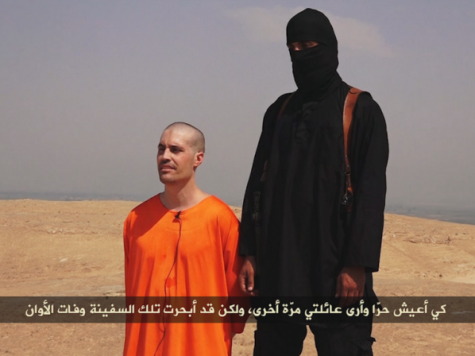The jihadist terror group Islamic State (IS), formerly known as ISIS, has become a particularly dangerous threat to the West through its guerrilla-style war tactics and decentralized organization, making targeting leaders more difficult for Western militaries.
ISIS leaders are now cracking down on social media, however, according to reports that leaders are calling for a ban on uploading beheading footage to the Internet.
A report first appearing in the Lebanese newspaper As-Safir, and later in Israel’s i24 News and Iran’s Ahlul Bayt News Agency, claims that Islamic State leaders are calling for jihadi commanders to order their underlings to stop uploading beheading videos online “without explicit permission.” Reports from i24 state that it is believed that these leaders are cracking down on the graphic footage because of fear that a deluge of violent social media coverage will damage the jihadist organization’s reputation.
In addition to the ban on beheading videos, i24 reports that top ISIS commanders have begun a purge of jihadist leaders who do not conform completely to the teachings of the Islamic State, even those who may promote beliefs too radical for the rest of the group. One commander allegedly killed for dissidence has been accused of calling al-Qaeda leader Ayman al-Zawahiri an apostate for his refusal to exclude Shia Muslims from the jihadist cause.
Clamping down on criticism of al-Qaeda appears a new line to tow for ISIS jihadists, who once formed the deadly al-Qaeda in Iraq wing of the group, but the two parted ways in February, as Islamic State members–and particularly leader Abu Bakr al-Baghdadi–refused to obey al-Qaeda’s leadership. After losing a significant number of members to the Islamic State, some wings of al Qaeda have begun to recognize the Islamic State’s sovereignty and ally with the group.
The ban on beheading videos appears to be a response to an increase in Islamic State beheading footage circulating on the Internet since the execution of James Wright Foley, an American journalist kidnapped in Syria. Videos depicting the beheading of a Kurdish man and Lebanese soldier, in particular, have made the rounds online and served to continue establishing the Islamic State as one of the most brutally violent jihadist groups in the world.
The Islamic State’s propaganda outfit has gone out of its way not to depict itself as such, however. ISIS’s Al Hayat Media, an English-language online propaganda outlet, has instead released videos of Western jihadists describing the joy of living in the Islamic State, emphasizing a promise of peace of mind to Muslims who seek to live in IS-controlled areas.
The Islamic State has never depicted itself as a softer version of jihad, but it has done what al Qaeda never has: promised death to all infidels, of course, but also peace and security to jihadists. It has promised a tight-knit family of extremist Islamists to feed, clothe, and protect Muslims from the non-existent threat of Western decadence. They have branded themselves as one of the few jihadist groups with a public sense of humor, love of animals, and knowledge of Western culture. Islamic State jihadists may spend their days stoning, beheading, and preaching hate, but at the end of a long day of jihad, they come home to chat about Jumanji on Twitter. This makes them a much more efficient recruitment tool for their target demographic, adolescent and young adult Western Muslim males for whom leaving the luxury of Western life may prove more difficult than for the average Syrian or Iraqi Sunni Muslim.
A complete switch from videos of children singing the Islamic State’s official song to videos of violent beheadings threatens to scare away Westerners who may have a soft spot for the concept of jihad; thus, the crackdown on beheading videos. It is yet another reminder that the Islamic State is a much more sophisticated machine than the assortment of rag-tag (yet still extremely dangerous) jihadist groups the West has faced in the past–an Islamist cult possessed of a vanity that has significantly strengthened its numbers in both Iraq and Syria.

COMMENTS
Please let us know if you're having issues with commenting.